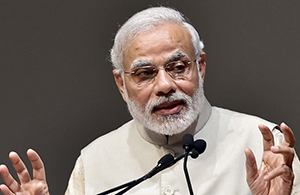New Delhi, Oct 9: Prime Minister Narendra Modi today said this year's Vijaya Dashami is "very special" for the country, an apparent reference to the Army's surgical strikes on terror launch pads across LOC, even as he stressed that a "very capable" armed forces is a must for a strong nation.

"We will celebrate Vijaya Dashami in the coming days. This year's Vijaya Dashami is very special for the country," he said, evoking a thunderous applause from the audience at a function at Vigyan Bhavan here.
His remarks came in the backdrop of Indian Army's surgical strikes in POK. He also gave his best wishes to the people on the occasion of the festival that marks victory of good over evil.
The Prime Minister released a compendium of 15 books on the life and teachings of former Jana Sangh chief Deendayal Upadhyay whose birth centenary year is being celebrated by BJP.
Modi said Upadhyay's biggest contribution was the concept of organisation-based political party and not a political outfit run by a handful of individuals.
Quoting Upadhyay, the Prime Minister stressed on the need for an exceptionally strong military as a prerequisite for a strong nation and said the country must be a capable one which is a present-day requirement.
"He (Upadhyay) used to say that the country's armed forces should be very very capable, then only the nation can be strong," Modi said.
"In this time of competitiveness, the need is that the nation should be capable and strong," he said.
In a veiled reference to Pakistan, Modi said, "Being strong does not mean being against anyone. If we exercise for our strength, then the neighbour need not worry (thinking) that it is to target him. I am exercising to strengthen myself and for my health."
Referring to Upadhyay, he said even Ram Manohar Lohia spoke about the Jana Sangh leader's efforts that led to the evolution of an alternative to Congress in 1967.
The Prime Minister said as a tribute to Upadhyay, who talked of integral humanism, his government was making the poorest of the poor the focus of schemes evolved by it.
"The biggest contribution of Deendayalji is organisation- based political parties and not just a party run by a handful of individuals. This was the identity of Jana Sangh and BJP," he said.
"In a short span of time, one party completed the journey from 'vipaksh' to 'vikalp' and this was due to foundations laid by Deendayalji," he said, adding that simplicity was the hallmark of the former Jana Sangh leader.
Lauding the ideology of Upadhyay, Modi said he gave impetus to 'karyakarta nirman' (building party workers) and the workers inspired by him were party centric and the party nation centric.
He said at the core of Upadhyay's thoughts were the poor, the villages, the farmers, the Dalits and the marginalised and that is why this government is laying focus on such sections during the centenary year celebration.
"The poor is the central point of Panditji's entire thinking. He used to say that the poor should be the central point of every thing. That is why in this journey towards development, our government is focussing on the poor and to help empower it.
"This government is celebrating Panditji's centenary as 'gareeb kalyan varsh'. Because of that government decisions focus on the poor and poor-centric schemes and policies are evolved. I am confident that there will be no shortcoming in this journey," he said.
BJP President Amit Shah and RSS' second-in-command Suresh Bhayyaji Joshi spoke on the need for strengthening India's security with Joshi saying that India's pursuit for national security was inspired by the need to defend itself rather than to defeat others.
Shah, at the function to release "The Complete Works of Deendayal Upadhyaya", said the former Jana Sangh chief's philosophy is an ideal for those in public life and warnings given by him many years ago are staring at the world today.
"The concept of maintaining a balance between development and nature that he put forth, is before us today in the form of global warming and air and water pollution. If the world would have moved forward on the path of integral humanism, then probably the world would not have faced the present-day problems," he said.
"Earlier it was considered that there is a contradiction between a welfare state and development. This BJP government has proved that despite being poor the country can be empowered.
"This government has made this country secure. Without diverting from the path of peace, the BJP government has ensured the country's safety and security," he said.
Shah lauded Upadhyay as a successful politician who laid the foundation for an alternative to Congress when no option against it was available. He also highlighted his example of evolving alternative politics on basis of ideals, organisation and nationalism.
"He was the first to talk of cultural nationalism and that was his contribution to the country's polity. He had sown the seed of organisation-based political party's thought and BJP has today emerged as a big party and it was imperative upon all workers to follow the path shown by him," he said.
Earlier, RSS leader Bhaiyyaji Joshi said the thoughts of Upadhyay given many years ago are now recognised by the world. He said the late Jana Sangh leader accepted everything that went in the welfare of humanity and had said that if humans are happy the society will be happier.
"India should be safe and secure. It's borders are posing a challenge and everyone has seen that this issue can be resolved too," he said.
"India has a lot to give to the world and that is being recognised now. India's strength is never destructive, but constructive. India's strength has never been used to spread boundaries and be expansionist. We go to win over the world but not defeat anyone...There is need that India should be a country that should lead the world," he also said.
The compendium highlights key events in the life of Upadhyay and the journey of the Jana Sangh and of the country, including watershed events like the 1965 Indo- Pakistan war, the Tashkent Agreement and Goa's liberation.
The collection collated from varied sources contains writings, speeches, intellectual discourses and dialogues of Upadhyay, who pioneered the philosophy of integral humanism.
The volumes are dedicated to 15 personalities including Syama Prasad Mookerjee. The penultimate volume relates to the events leading upto the murder of Upadhyay soon after he became Jana Sangh chief in 1967.







Comments
15 lakhs special
FAKE bahut Faketha hai
Add new comment